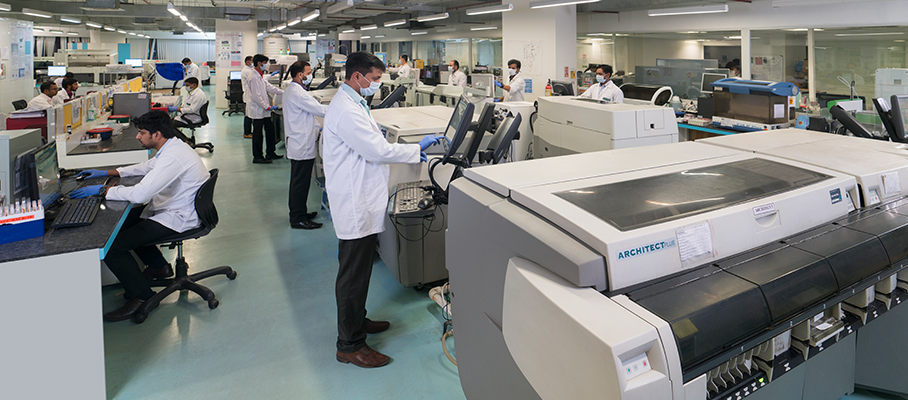Latest Blogs
Metropolis announces launch of New Antibody Test for Major Kidney Disease
*Keeping pace with newer biomarkers in Autoimmunity- new antibody test launched for renal disease* 11th March 2015: One of the major kidney diseases, Nephrotic Syndrome is defined by massive continued loss of urinary proteins and edema (water retention). One of the major causes of Nephrotic Syndrome is Membranous Nephropathy or Membranous Glomerulonephritis which is a chronic inflammatory disease of the glomeruli (the network of capillaries in kidneys that perform the first step in filtering blood). In Membranous Nephropathy, an antibody-antigen complex otherwise called as the immune complex is formed in the glomerulus. This eventually leads to loss in kidney function and kidney failure. Membranous Nephropathy can be primary (where cause of the disease is not known; idiopathic) or could be secondary (as a result of an underlying condition like prolonged infection, tumor, cancer and even certain medications etc). It is important to differentiate primary and secondary since the treatment and disease management varies. In Primary Membranous Nephropathy, an individual undergoes an immunosuppressive therapy or kidney transplant), whereas in secondary, the underlying disease is treated. PLA2R Antibody Test is used to correctly differentiate the two kinds of disease, evaluate the intensity of the disease, monitor therapy and risk assessment after kidney transplant. Advantages of the test Serum based test and requires only a blood sample Easy to perform Presents a non-invasive alternative to the common biopsy. Anti-PLA2R autoantibodies are a highly specific and sensitive marker for primary MN. Additionally to its usage in differentiation of primary and secondary MN, the anti-PLA2R titer reveals a high predictive value for: Disease evaluation Anti-PLA2R autoantibody results correlate with disease activity (proteinuria). High titers are directly proportional with a severe course of primary MN. Therapy monitoring The anti-PLA2R autoantibody titer decreases in patients undergoing successful immunosuppressive therapy. A relapse of disease is associated with a recurrence of the antibodies. Furthermore, a high anti-PLA2R titer was identified as a considerable risk factor for primary MN patients to not achieve a remission of proteinuria. Risk assessment Up to 40 % of patients with primary MN experience a relapse after kidney transplantation. This risk is particularly high if anti-PLA2R autoantibodies are persistently found during the six months after organ transplantation. Therefore, the titer can be useful to assess the necessity and intensity of an immunosuppressive therapy after transplantation to avoid relapses. Commenting on the test, Dr Deepak Sanghavi who heads the Immunochemistry section at Metropolis Healthcare said “It is an important test that will help improve outcomes and disease management in such a chronic kidney disease. We have tied up with few hospitals and Institute of Kidney Diseases and offer this test at INR 4,500. Out of the suspected samples that we receive, almost 4 out of 10 returns positive”
Low Vitamin D levels – Significance beyond Bone Health: Metropolis Healthcare
Despite ample sunlight in India throughout the year, almost 80% of Indians are deficient in Vitamin D. Prolonged Vitamin D deficiency leads to a host of health issues. Recent studies link Vitamin D Deficiency with Diabetes, metabolic syndrome, blood pressure, heart disease, stroke and may even trigger symptoms of depression in a healthy population. There are various studies that directly correlate Vitamin D deficiency to PTH levels in the blood which is studied further in detail here. Vitamin D Deficiency& Parathyroid Hormone (PTH) Vitamin D deficiency, simply put is having low levels of Vitamin D in body, which causes the bones to become thin, porous and brittle.Vitamin D helps the intestines absorb calcium. Once activated, Vitamin D acts to greatly increase the amount of calcium that the intestines can absorb from food. For patients with vitamin D deficiency, it is difficult for the body to obtain calcium from the diet. This often leads to a rise in the PTH level, since the parathyroid glands must increase the PTH production, in order to increase calcium levels they absorb it from bones. Therefore, people with a normal blood calcium levels and a high PTH level may have secondary hyperparathyroidism, which means that the high PTH level is a normal response of healthy parathyroid glands to another problem (like vitamin D deficiency or kidney failure).The sole purpose of the parathyroid glands is to control calcium within the blood in a very tight range between 9.0 and 10.1. In doing so, parathyroid glands also control how much calcium is in the bones, and therefore, how strong and dense the bones are. Primary hyperparathyroidism Primary hyperparathyroidism most of the times results due to a non-cancerous tumor of the parathyroid, called an adenoma. Because of the adenoma, the parathyroid can make too much PTH, which can cause calcium to be too high in the blood, and overtime, lead to poor bone health. Sometimes doctors decide to treat primary hyperparathyroidism surgically, by removing the adenoma. If you have primary hyperparathyroidism, you need to work with your doctor to see if you can take vitamin D. Since you may have high blood calcium, it’s important to make sure you’re under a doctor’s supervision if considering taking vitamin D. Secondary hyperparathyroidism Secondary hyperparathyroidism is caused by either long term vitamin D deficiency or kidney failure. With long term vitamin D deficiency, the body may not get enough vitamin D to absorb adequate calcium. This can be corrected by treating vitamin D deficiency. It is important to note that accurate diagnosis is important to get to the core of the disorder and decide course and dosage of treatment accordingly. How does the Human body ensure that there is adequate amount of calcium in the blood? The human body can produce Vitamin D3 from direct exposure to sunlight. 7-dehydrocholestrerol is converted to Vitamin D3 with the help of UV Rays. However a large population of India does not face the sun as over 80% of the population is deficient in Vitamin D Poor/inefficient exposure to sunlight Sunscreen, full sleeved clothes acts as an impediment Dark colored skin requires longer exposure to sunlight Poor dietary /supplementary intake When you get enough vitamin D from good sun exposure and supplementation habits and enough calcium from your diet, this allows you to maintain a healthy calcium level in your blood and keep good amounts of calcium in your bones. Healthy vitamin D and calcium habits also help keep your PTH levels in check. Prolonged Vitamin D Insufficiency or Deficiency leads to reflex increase in PTH levels in the blood. This is called secondary Hyperparathyroidism, in which PTH mobilizes bone calcium which leads to increased bone fragility and risk of fractures or increased level of calcium in blood. Secondary Hyperparathyroidism is commonly the result of compensatory over secretion of PTH in response to Vitamin D deficiency. In a recent study done by the R&D team at Metropolis Healthcare, the following are the study results. According to R&D team in Metropolis Healthcare, when the calcium level in the blood drops, due to Vitamin D deficiency, high levels of Parathyroid Hormone (PTH) are secreted by the parathyroid gland, which absorbs calcium from bones, leading it to become brittle and porous. How it affects the people? Many people with Vitamin D deficiency can have increased levels of Parathyroid Hormone (PTH) in the body. The main function of PTH is to maintain calcium levels in the blood stream. With the decrease in Vitamin D levels, there will be drop in the calcium levels, in order to balance the calcium level in the blood, parathyroid gland starts secreting high levels of parathyroid hormone. PTH starts to absorb calcium from bone replenishing the calcium level in the blood, which in turns leads to weakening of bones, making it more fragile or prone to fractures. The Study In an analysis of over 7,542 patients who underwent both Vitamin D and PTH tests, the following trends emerged. An increasing trend can be witnessed from 30 to 40 age group and above, indicating an increasing level of susceptibility with progression in age Observations: Elevated PTH levels were found in the age group of 20 – 50 years contributing to 24.11%. Such patients are at a high risk of developing High BP, Diabetes, Heart diseases. Of these deficient samples 28.98% were of women.Vitamin D deficiency with PTH elevation can have several ill effects on bone and increased risk of high BP, Diabetes & Heart disease.
Allergens to Watch Out for This Winter: Metropolis Study
“Allergy” indicates an abnormally hypersensitive immune reaction to naturally occurring substances called antigens.This immune overreaction can results in respiratory symptoms like breathlessness, coughing, sneezing, runny nose and scratchy throat, skin related symptoms like itching, hives and rashes. In severe cases it can also result in lower blood pressure, asthma attacks, and in a rare event, even death. Allergy testing is critical to make proper avoidance recommendations, to prevent further harm and provide the required guidance in proper selection and timing of medications. An allergy test comprises of a screening test wherein it is determined whether a person is atopic or not. If the test result is positive, then based on symptoms, age, environment, geographical location, medical history, the patient undergoes a panel test which determines the exact allergen causing problem. There are several panels ranging from inhalant, food, environment, territory specific, indoor etc and over 700 different allergens can be tested for. This method is US FDA approved and Anti-histamines do not have any effect on the test results. In order to understand the intensity of the allergy pattern in the country, Metropolis Healthcare Ltd, the Pathology Specialist, conducted a comprehensive study on 20,293 tests processed in 2014. Out of 20,293 samples 15.79% showed the positive allergen results in their blood samples. TypePositiveNegativeGrand TotalFungus (Mold)37131613532Dust (Dust mites, House dust, Cockroach dust)131016722982Food1113980110914Animal dander18115741755Pollen (Trees, grasses)2298811110Grand Total32041708920293 The study reveals the worrying trend in various types of allergens, 43.93% patients were positive for dusts, followed by Pollens, Fungus and Animal dander denotes around 20.63%, 10.50%, 10.31%, respectively. An analysis of all positive samples reveals the following analysis. The most common food allergy signs and symptoms include: Hives, itching or eczema Swelling of the lips, face, tongue and throat or other parts of the body Wheezing, nasal congestion or trouble breathing Abdominal pain, diarrhea, nausea or vomiting Dizziness, lightheadedness or fainting Adding on the study Dr. Deepak Sanghavi, Deputy Chief of Lab Services, Metropolis Healthcare Ltd., Mumbai said “It’s easy to confuse a food allergy with a much more common reaction known as food intolerance. Today allergy blood tests are more convenient and accurate than ever before. When combined with a detailed medical history, allergy testing can identify the specific things that trigger your allergic reactions”
Metropolis Healthcare launches ‘The Marathon’ Health Check – up Package
Mumbai December 2015:Metropolis Healthcare Ltd, The Pathology Specialist haslaunched ‘The Metropolis Marathon Package’ a comprehensive diagnostic package comprising 20 distinct tests to screen the complete health of a marathoner. The first of its kind diagnostic initiative will be available across Metropolis centers in Mumbai. The sheer number of Indian runners participating in marathons continues to grow and new half marathons and full marathons are being added every year. Marathon is considered as the ultimate running challenge and marathon enthusiasts train for over a year before the grand finale. Training for a marathon can be just as strenuous as running a marathon. It is important to understand that running for 42kms (full marathon) or 21kms (half-marathon) needs a different conditioning for the body and muscles. ‘The Metropolis Marathon Package’ is a comprehensive health package comprising a group of tests to screen the complete health of individuals taking part in the marathon which includes an in-depth cardiac risk analysis and an overall assessment of kidney and liver function. Whether you are a novice or a seasoned marathon runner, it is important to know your physical limits and capabilities. Prolong running may cause difficulties to heart in refilling chambers and abnormalities in pumping blood from the right side of the heart to the lungs. Health checks every runner must undergo Are you fit enough to run a Marathon? Do you have a family history of Diabetes/Blood pressure/Heart Attack? Need for medical clearance before a marathon? What are the risks associated with a Marathon? General Body Check–Test Name: CBC- To check anaemia, infection and measure cell count of various blood components.Result: Good haemoglobin levels are very important for marathon runners. Diabetes Check –Test Name: HBA1c, Glucose Fasting, D3 HydroxyButarate.Result: Endurance training lowers blood sugar. May lead to diabetic ketoacidosis which is life-threatening. The above tests will help diabetics plan their insulin doses and also screen general mass of diabetes. Cardiac Check – Test Name: Lipid Profile Mini, CPK-Total, Stress test, ECG, Blood Pressure.Result: High levels of HDL cholesterol are generally observed in endurance / marathon trainers. HDL facilitates fibrinolysis and prevents the occurrence of coronary heart disease. Abnormally high levels of LDL may require further testing before the run. Test Name: CPKResult:High CPK suggests muscle / heart / brain injury which may be aggravated because of endurance training. Hence it becomes important to monitor CPK. Test Name:ECG/Stress TestResult: Important test to monitor the functioning of heart in order to prevent sudden heart failure post marathon. Bone Health Check –Test Name: Calcium / Vit DResult: People with low calcium and Vit D are more prone to ligament / muscular/ bone injuries. Such deficiencies prolong the process of healing of injuries. Kidney Health Check –Test Name: Kidney Function TestResult: Kidneys help regulate blood pressure and plays a vital role in the production of RBCs. Normal kidneys is required for high level endurance training. Liver Health Check –Test Name: Liver function TestResult: Liver plays a vital role in digestion, metabolism and detoxification. Hence it is important to monitor this organ before a marathon as during the run large toxins are produced in the body. Speaking on the launch, Dr Nilesh Shah, Group President & SBU Head, West India, Metropolis Healthcare said, “We have seen and heard of instances where athletes collapse during marathon due to sudden cardiac arrest or shooting up of blood pressure etc. The body undergoes various changes with the age and one must not take it for granted; a thorough check-up should be carried out before undertaking any such activity under the supervision of a qualified physician and one should also understand one’s physical limitation. Nothing is more precious than life. Also patients suffering from asthma, lung or kidney issues, diabetes should be extremely cautious before undertaking the marathon.” With the huge growing popularity of marathon running, it’s important to make sure that the body is up for the challenge.Getting acquainted of personal health records, heart rate and blood sugar level, is the best way to safeguard long-term health issues by classifying troublesome concerns at the earliest.
1 in 5 women affected by PCOS: Metropolis Study
Women between the age group of 15 and 30 are at high risk of PCOS East India leads the chart with 1 in 4 women suffering from PCOS Metropolis Healthcare Ltd, a multinational chain of pathology laboratories; conducted an inclusive study on Polycystic Ovarian Syndrome (PCOS) to observe the trends in PCOS cases in young women in India. Polycystic Ovarian Syndrome commonly known as PCOS, is a very prevalent reproductive disorder in women and the leading cause of fertility among women today. Metropolis conducted a comprehensive pan India study on 27411 samples of testosterone over a period of 18 months. Out of 27411 samples, around 4824, (17.60%) of the females face hormonal associated risk with polycystic ovarian syndrome. The increasing trend of PCOS is predominantly seen in the age group 15 to 30 years. Among the samples tested East India shows alarming levels of 25.88% women affected by PCOS, followed by 18.62% in North India, which can be largely attributed to lack of awareness among young women and ignorance. Commenting on the study Dr.SonaliKolte, General Manager – Medico Marketing, Metropolis Healthcare Ltd said, “Undiagnosed PCOS can lead to infertility and in long term can cause several health complications; which can be attributed to other factors as well. Early diagnosis and treatment can help control the symptoms and prevent health related problems. Today a lot of young women are aware of the condition and seek medical help” What is PCOS? It is a common misconception that PCOS is all about cysts but it is in fact a characteristic amalgamation of cosmetic, gynecological and metabolic symptoms. Cosmetic symptoms include facial hair, thinning of the scalp and acne. Gynecological symptoms include irregular or scanty periods which are usually the first red flag in adolescents. Infertility and recurrent pregnancy loss affects the women in the reproductive age. PCOS in older women could even lead to cancer of the uterus, cardiac disease and type 2 diabetes. Hence it is important to manage the symptom along with proper diet and exercise. Awareness and accurate diagnosis is the first step in managing PCOS in a way that it improves quality of life of the patient. Women with PCOS may have enlarged ovaries that contain small collection of fluids called cyst. The cysts are not harmful, but can lead to hormonal imbalances. Diagnosis: Testosterone test along with a host of other tests (blood sugar, insulin, FSH, LH, 17OHP, DHEAS) are carried out to ascertain PCOS in women. Testosterone plays an important role in both men and women, as it affects the brain, bone, muscle, fat distribution, sexual functions etc. Women have much lower amount of testosterone in the body compared to men. The below tables has been segregated zone wise to give an overall picture of PCOS in India ZoneAbnormal Profiles (in %)North India18.62East India25.88West India19.88South India18 (Reference range: Testosterone Total: 15 – 70 ng/dl, Testosterone Free: 0.29 – 3.18 pg/ml, DHEAS: 45 – 270 ug/dl)
 Home Visit
Home Visit Upload
Upload


















 WhatsApp
WhatsApp